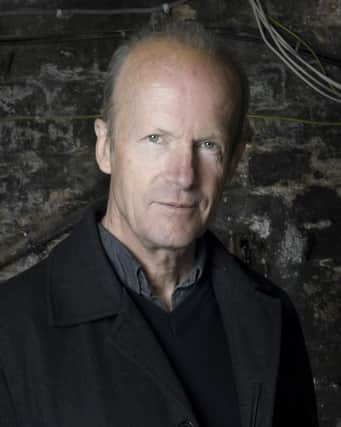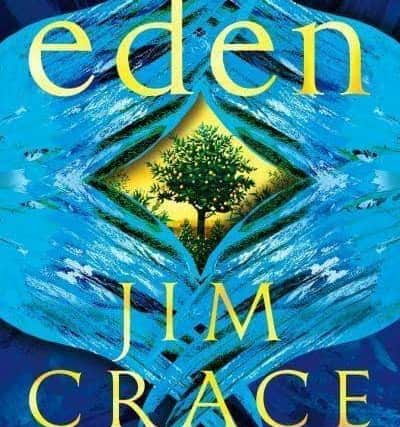Book review: eden, by Jim Crace


Jim Crace’s novels are wonderful enigmas. They are fables without evident moral apothegms, or allegories that refuse to reveal their key. In works such as Quarantine, Being Dead, The Pesthouse and Harvest he has fashioned books that feel as mythic as they are cryptic. His latest, eden, is in his signature limpid style and prompts the same delightful befuddlement in the reader. As TS Eliot wrote, “We had the experience but missed the meaning”. As with the aforementioned novels, there is a static crackle of imminent violence throughout this book, right up until it becomes immediate.
It is often useful to question what the beginning of a novel really is. For example, despite numerous pub quizzes, Moby-Dick does not begin “Call me Ishmael”. Here, we have an epigraph – “Regard the Angels and / their glisten’d Wings; / Behold their flightless underlings / At labour in the fields”, purportedly from Visitations 7:12. No such book exists (and I know my Biblical apocrypha quite well). More interesting is the sleight of hand, the riddle – why are their wings “glisten’d” and not “glistening”? They seem to have been made slippery, rather than being naturally iridescent.
Advertisement
Hide AdThe Eden of eden is and is not the familiar Eden. It begins familiarly enough, in that Adam and Eve have been expelled for a transgression, and entered into a world of suffering, illness and death. But the garden is still populated by angels and immortal though human gardeners. Crace has usually worked with a tight set of principle characters, and here we have the free-spirited Tabi who has escaped from paradise; her workmate, the orchardman Ebon who loves her; and the sour Alum, the go-between and “snitch” for the angels, who “wants – demands in fact - … not false warmth from his so-called equals but deference. If the angels will not tolerate disrespect, nor should he”, a kind of Cain and Judas at once. There is one angel unlike the others, Jamin, who is both Icarus and Lucifer. He flew too close to the tainted earth beyond the garden, and has hobbled his wing; to the extent he is now given the lowliest of duties tending the fishpond.


Tabi’s excursion beyond Eden kindles the crisis. Ebon wants to be reunited with her; Alum wants to find her and punish her; Jamin misses her, even her blasphemous outbursts. The opening scene involves the angels summoning the denizens of Eden to witness the funeral of a “jack” – presumably jackdaw – to reinforce to them their fortune at being eternal and the consequences of seeking beyond the garden. But it is a blistered blessedness: “it’s time for darkness to descend, for bats and stars” (a lovely assonance) “for singing, supper, prayers and sleep. Rest well, he says again. It’s for the jack, the fruiting trees and for himself; it’s for the woman who’s lost to him, her dying day that ends again, and ends again, and ends”.
Crace’s prose is marvellously off-kilter. Archaic words occur throughout – frass, laths, filberts, bellygills, mullein, cote, luke-white, slypes, spraint, fids – giving an appropriately timeless quality to Eden. The angels themselves are described, but with enough ambiguity to make them inconceivable. We know their feathers are such that unlike the sea – which only the angels have seen – where “a moment passes and the sapphire is slate, another moment and the slate is jade, and then the jade is silvery”, they are “blue… everlasting”. They have beaks, and combs, and talons. As Rilke put it in the Duino Elegies, “every angel is terrifying.” One of Tabi’s earliest chippings at utopia is wondering if the humans are needed only because their avian guardians, having wings but not arms, cannot use a gardening implement. They are “the guardians of love and harmony. Possibly, when they were first engendered by the lord on the fifth day and sent to fly across the dome of the sky as his custodians and heralds, they might have been unblemished. But time… well, time erodes, especially when there is no end to it”.
This being a novel by Jim Crace, catastrophe is to be expected. As with previous novels, this is about societies in transition, often as revolting as revolutionary. Is this Eden a gated community, a surveillance state, a place where obedience is freedom? Or is it a tiny ecosystem preserved from a ravaged and dangerous world, a last “tamed space” rather than “wild spaces”?
Crace plays his cards very close to his chest indeed. If there is any explanation, it comes towards the ends, and reveals little. “This is a story that will be told for years to come. A love story, a history, a tale of wisdom gained, of growing old, of treasuring what’s drawn in air as much as what is solid earth and stone, of clinging close to flesh and bark, of birds and bells, of work and play, and forging out of hardship hope. This is a story that unends”. At which point the reader realises that Eden is here and now and always has been, as has been the Fall, and as has been the possibility of redemption. Most writers rewriting such tropes impose an agenda: thank goodness for Crace, who says no answers will be given but action must be taken.
eden, by Jim Crace, Picador, £16.99